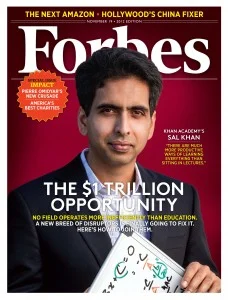 Salman Khan has made a name for himself and his Khan Academy by revolutionizing the way we approach learning in the Internet age. From what started out with Khan, a former senior analyst at a hedge fund, tutoring his niece in math via YouTube demonstrations has turned into breakthrough educational tool that offers thousands of videos on a plethora of topics. All free of charge.
Salman Khan has made a name for himself and his Khan Academy by revolutionizing the way we approach learning in the Internet age. From what started out with Khan, a former senior analyst at a hedge fund, tutoring his niece in math via YouTube demonstrations has turned into breakthrough educational tool that offers thousands of videos on a plethora of topics. All free of charge.
Khan explained his vision in a TED talk back in 2011. But tackling a worldwide change in education isn’t the only thing on Khan’s plate any more. The Khan academy has grown to 80 people and he himself is now a student learning how to manage and lead a cutting edge organization.
A recent interview with Forbes highlighted this change.
“We’re this organization that’s all about learning,” he says. “But I find myself at a spot where it’s like, wow, there’s this whole thing called management. There’s a whole art to it. We’re asking ‘What does management training at Khan Academy mean?’”
His experience has shown him that he is not alone in this endeavor. The same educational issues that his company is trying to address also exist in the corporate world.
“Most companies ‘have formal training programs that mirror traditional academic models,’ and they’re making the same mistakes schools did. ‘There are two things that are even more true about the workplace than the classroom,’ he says. ‘The first is that the differences between people’s gaps in understanding are more diverse. The second is that there is even more need for people to learn asynchronously.’”
Khan believes that the manager/teacher roll in which managers assess the gaps of employees and coach them to achieve goals and master skills at an individualized pace is the best approach for creating an optimal learning environment within the workplace.
